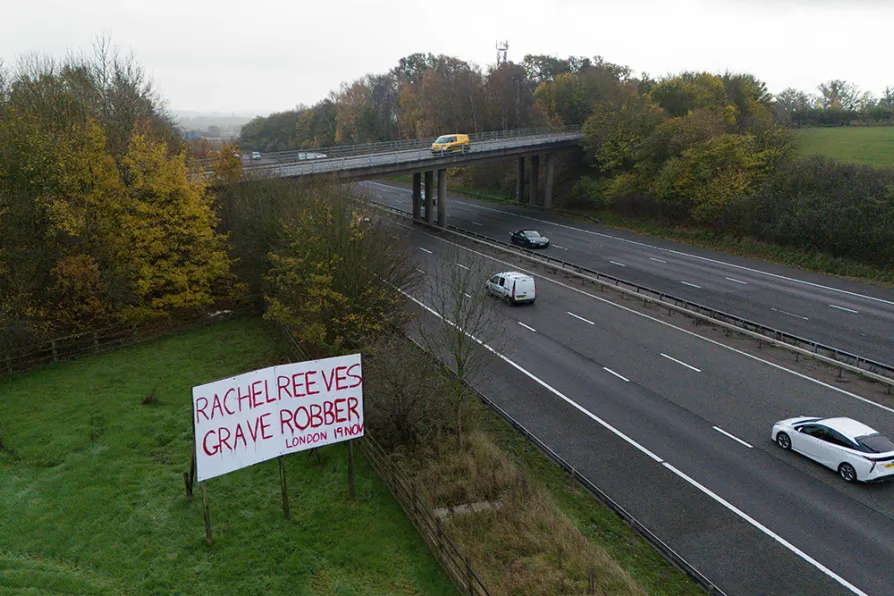Does widespread and uncontrolled use of AI change our relationship with scientific meaning? Or with each other? ask ROX MIDDLETON, LIAM SHAW and MIRIAM GAUNTLETT
CAROL WILCOX argues for the proper implementation of the land value tax, which could see unused plots sold off and landlords priced out of landlordism, potentially resolving the housing and planning crises


LAND (encompassing natural resources) is one of the factors of production, along with labour and capital. Capital is produced by labour (workers) using land. In economics, it is everything except humans and what they have created — the environment.
Land value tax (LVT) is an annual tax paid by landowners. It requires the government to assess the value of every landholding, set a rate or rates and send the bill to the owner. Labour put LVT on the statute book in 1931, but it was never implemented, since when the importance of land has been ignored.
Land value consists of its natural attributes, such as soil fertility, mineral deposits, and landscape; local facilities such as public transport, shops; and statutory permitted use. Land without buildings is not difficult to value. Australia does it every other year. The Valuation Office here assessed the value of all English land in 2019.
The Land Registry, which records British landownership, is 87 per cent complete and could be quickly completed by legislating for owners of unregistered land to register or lose their title. Any unregistered land remaining could be claimed by local authorities to use or sell.
What we generally think of as rent is what one pays to the owner to occupy a house, shop, etc. In economics, rent is what you pay the owner for exclusive use of their land. LVT taxes this kind of rent.
The LVT rate is a proportion of the unearned income from owning land. Business rates are 50 per cent of rental value, set by central government. Council tax is the main source of funding for local authorities, which set their own rates. To contrast with business rates, the average rate set by London boroughs is about 5 per cent of rental value.
LVT is not an additional tax. It would replace current property taxes, which all have major faults.
Stamp duty discourages people from moving. Business rates discourage investment in buildings — improve your employees’ environment and your tax rises. Council tax is the most regressive tax we have. Councils in rich areas have a big tax base (more Band H properties) and set lower rates than poor areas. The owner of a Mayfair mansion pays little more than the tenant of a bedsit in Portland, one of the most deprived towns in England. Britain is unique in taxing occupants rather than owners.
LVT is the only policy that can fix the affordable housing crisis. This is how.
Most of house price is land value. Land represents more than 90 per cent of house price in parts of London. An old building in a good location can be worth less than nothing because of the cost of demolition. LVT would cause land, and hence house prices, to plummet, because the market would take account of the continual (high) cost of ownership.
LVT will extract most of the landlord’s profit. Houses would no longer be a safe investment, and second homes would be less affordable. This would generate a mass sell-off of such properties: increased supply means lower prices and would enable either tenants to buy, or councils with sitting tenants — the rents will increase their revenues.
Seventy per cent of British land is owned by just 1 per cent of the population, much of it the vast rural estates passed down the generations by mates of a monarch. The new tax liabilities would force some to sell up, further depressing prices. This would be an opportunity for local authorities to purchase big areas of undeveloped land at knock-down prices, in order to build beautiful garden towns and cities and plenty of council houses.
Land-banking would be eradicated as LVT is payable on land at its current permitted use, whether used or not. Big developers would need to build out quickly or sell to small or self-builders who do. Large sites with planning consent for development would incur big tax bills, but delaying application for change of use won’t help much because LVT is payable on agricultural land too. This may sound crazy, because everyone knows that the real farmers who grow our food are struggling, but they need proper government support, not subsidies or tax breaks.
Over 60 per cent of English farmland is wholly or partly tenanted. Tenants pay the full land rent (100 per cent rate LVT) to the owner, so LVT is inherently affordable. Agricultural land value is low but inflated by those buying for investment and tax purposes, or as a hobby. As with residential land, LVT would cause a big sell-off, enabling tenant farmers to own and others to expand. Farm prices will be so low that none need worry about hitting the inheritance tax threshold.
Unused usable land represents a permanent loss to production, like unemployment. With its dynamic effect on the economy, LVT has the potential to eventually generate enough revenue to abolish income tax on wages.

Our housing crisis isn’t an accident – it’s class war, trapping millions in poverty while landlords and billionaires profit. To solve it, we need comprehensive transformation, not mere tokenistic reform, writes BECK ROBERTSON

GLYN ROBBINS celebrates how tenant-led campaigning forced the government to drop Pay to Stay, fixed-term tenancies and council home sell-offs under Cameron — but warns that Labour’s faith in private developers will require renewed resistance











